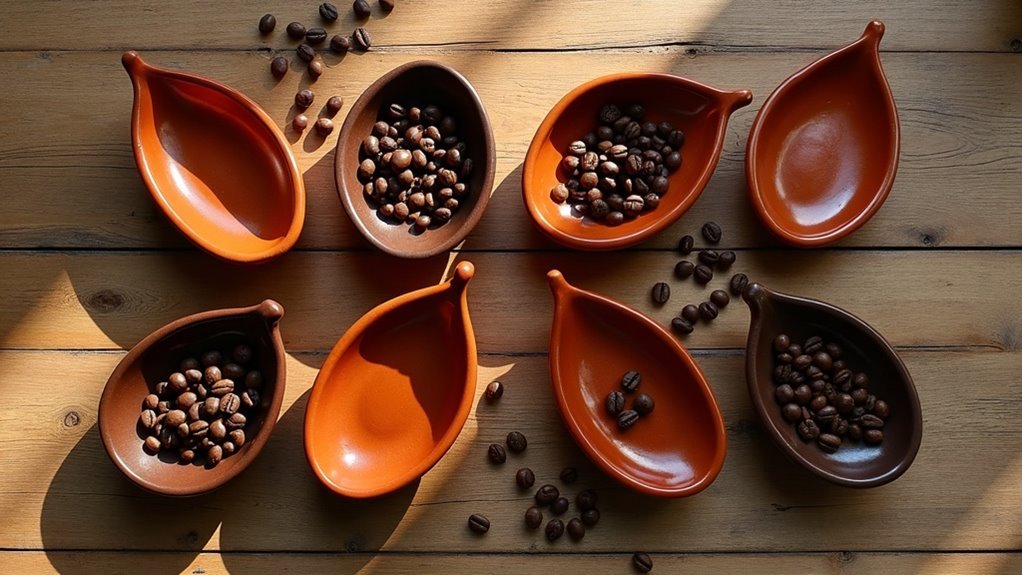Yes, coffee can worsen gastritis symptoms. It increases stomach acidity and can irritate your stomach lining, potentially leading to discomfort. If you’re sensitive, coffee might trigger nausea and abdominal pain. It’s advisable to limit coffee intake, particularly high-acid varieties, and consider alternatives like low-acid options. Gradually reducing caffeine can also be beneficial for managing symptoms. There are effective dietary and lifestyle changes you can explore to support your gastric health and improve your overall well-being while still enjoying coffee in moderation.
Key Takeaways
- Coffee can increase stomach acid production, potentially worsening gastritis symptoms in sensitive individuals.
- Certain compounds in coffee may irritate the stomach lining, exacerbating inflammation.
- Prolonged coffee consumption, especially when combined with NSAIDs, heightens the risk of developing gastritis.
- Opting for low-acid coffee varieties and practicing moderation can help manage gastritis symptoms effectively.
- It is important to consult a healthcare professional for personalized advice on coffee consumption and gastritis management.
What Is Gastritis?
Gastritis is fundamentally the inflammation or irritation of your stomach lining, which can lead to uncomfortable symptoms like nausea and abdominal pain.
This condition can manifest as erosive gastritis, where the stomach lining erodes, or non-erosive gastritis, which presents inflammation without erosion. Symptoms vary and may include feelings of fullness, belching, hiccups, and loss of appetite, all of which can markedly affect your digestive health. Excessive acid production can exacerbate these symptoms.
Gastritis can be erosive or non-erosive, causing symptoms like fullness, belching, and loss of appetite, which impact digestive health.
If you experience any signs of gastritis, seeking medical advice is essential to prevent complications such as ulcers or even stomach cancer.
When it comes to coffee, it’s worth noting that certain types of coffee can stimulate acid production and potentially aggravate gastritis symptoms.
If you enjoy coffee but have gastritis, you may want to consider lighter options or low-acid varieties. Always consult with a healthcare professional to tailor your diet to your digestive health needs.
Causes of Gastritis
Understanding the causes of gastritis is essential for managing its symptoms effectively. However, it’s also important to consider how coffee consumption can influence gastric health.
Certain compounds in coffee may irritate the stomach lining, potentially exacerbating inflammation. Additionally, prolonged use of NSAIDs alongside regular coffee intake could further increase the risk of developing gastritis.
Lifestyle choices, including alcohol consumption and dietary habits, also play significant roles in this condition. Factors such as bile reflux and autoimmune disorders can complicate your gastric health, making it crucial to monitor your coffee intake as part of a holistic approach to well-being.
Common Gastritis Triggers
When it comes to coffee and its effects on gastritis, it’s important to understand how this popular beverage can influence stomach health.
Coffee has the potential to aggravate gastritis symptoms due to its ability to stimulate increased stomach acid production. For those with a sensitive stomach, consuming coffee, especially in excessive amounts, may worsen discomfort.
Identifying coffee as a potential trigger is crucial for effective management of gastritis. Being mindful of your coffee intake and considering alternatives can help alleviate symptoms and support overall stomach health.
Inflammatory Factors Involved
While various factors contribute to the development of gastritis, certain inflammatory triggers related to coffee consumption play a significant role in exacerbating this condition.
Drinking coffee, especially in excess, can heighten stomach inflammation, particularly for those already suffering from gastritis. The acidic nature of coffee may irritate the stomach lining further, especially when combined with spicy and acidic foods.
Additionally, health issues and stress can intensify inflammation, making symptoms worse. Autoimmune disorders also contribute to gastritis, as your immune system mistakenly attacks the stomach lining.
Therefore, it’s essential to understand how coffee and these inflammatory factors can impact your overall gastric health.
Lifestyle Influence on Gastritis
Lifestyle choices greatly impact the development and management of gastritis, especially when it comes to coffee consumption. Key lifestyle factors include caffeine intake, dietary choices, and overall habits. Excessive coffee and spicy foods can irritate your stomach lining, worsening symptoms of gastritis. Additionally, regular NSAID use and high-stress levels can disrupt your gastrointestinal tract, triggering inflammation. Here’s a quick overview of these influences:
| Factor | Impact on Gastritis | Symptoms |
|---|---|---|
| Coffee Consumption | Increases acid production | Heartburn, discomfort |
| Dietary Choices | Exacerbates symptoms | Bloating, indigestion |
| Caffeine Intake | Can irritate the stomach lining | Pain, nausea |
| NSAID Use | Disrupts mucosal barrier | Abdominal pain |
| Stress | Affects immune response | Increased acidity |
Symptoms of Gastritis
Gastritis can significantly impact your daily life, and it may be particularly important for coffee lovers to be aware of its symptoms. You might experience abdominal pain, nausea, or even vomiting, which can be exacerbated by coffee consumption.
Some individuals report hiccups or a feeling of fullness after eating, which can lead to gastrointestinal (GI) issues such as indigestion and loss of appetite, particularly when enjoying their favorite brew.
Some people experience hiccups or fullness after meals, which can worsen GI issues when enjoying coffee.
If you notice severe symptoms like blood in vomit or black, tarry stools, it’s crucial to seek medical attention, as these could indicate bleeding and increase the risk of complications.
Understanding these symptoms can help you manage your condition effectively while still enjoying the pleasures of coffee in moderation.
How Coffee Affects Gastritis
When it comes to coffee and gastritis, understanding how this beloved beverage impacts your digestive health is crucial. Coffee can elevate acid levels in your stomach, which may irritate the stomach lining and worsen gastritis symptoms. The natural acidity of regular coffee can lead to inflammation, particularly for those with sensitive digestive systems.
However, there are ways to enjoy coffee while minimizing its effects on gastritis. Opting for low-acid coffee options, such as dark roasts or specially formulated brands, can help reduce irritation. Additionally, choosing decaffeinated coffee may be beneficial, as it limits caffeine-related stimulation in the gut.
Pairing coffee with food can also act as a buffer against stomach acid, providing some relief from gastritis discomfort. Enjoying coffee mindfully can still allow you to indulge in your favorite drink while managing your condition.
Types of Coffee and Their Impact
The choice of coffee you make can greatly affect your experience with gastritis. Different types impact your symptoms uniquely. For instance, decaffeinated coffee might lower gastric acid production, while low-acid coffee, like dark roast, can reduce irritation. Brewing methods also play a role; cold brewing typically results in less acidity than hot methods. Be cautious with dairy additives, as high-fat creamers can worsen digestive issues. It’s essential to monitor your individual tolerance to these types.
| Type of Coffee | Impact on Gastritis |
|---|---|
| Decaffeinated Coffee | Lowers gastric acid |
| Low-Acid Coffee | Reduces irritation |
| Dark Roast | Generally lower acidity |
| Cold Brew | Less acid than hot brewing |
| Dairy Additives | May exacerbate issues |
Dietary Changes for Managing Gastritis
To effectively manage gastritis, making thoughtful dietary changes is essential, especially for coffee lovers. While coffee can be a beloved beverage, it may need to be limited if it exacerbates discomfort. Consider choosing low-acid coffee options or reducing intake to see if symptoms improve.
Additionally, avoiding highly acidic items such as citrus and tomato products is crucial, as they can increase gastric acid. Instead, focus on incorporating low-acid, high-fiber foods like fruits, vegetables, and whole grains to promote digestive health.
Reducing spicy and fried foods is vital, as they can lead to increased inflammation. Opt for low-fat options like fish and consider nondairy alternatives if lactose intolerant, ensuring your diet supports overall digestive well-being.
Enjoy your coffee mindfully and pay attention to how it affects your gastritis symptoms.
Lifestyle Modifications to Consider
To effectively enjoy coffee while managing gastritis, consider making specific dietary adjustments and moderating your caffeine intake.
Limiting your coffee consumption to one or two cups per day can help reduce stomach irritation.
Additionally, exploring low-acid coffee options may further alleviate symptoms.
Monitoring how different types of coffee and brewing methods affect your condition will empower you to make informed choices for a better gastrointestinal experience while still enjoying your favorite beverage.
Dietary Adjustments Required
While managing gastritis, making thoughtful dietary adjustments can considerably alleviate symptoms and improve overall digestive health, particularly when it comes to coffee consumption. Here are three key changes to take into account:
- Reduce or eliminate coffee: Caffeine can elevate stomach acidity, worsening gastritis symptoms. If you’re sensitive, it may be best to minimize or avoid coffee altogether.
- Opt for low-acid coffee: If you choose to continue enjoying coffee, select dark roast or specific low-acid brands. These options tend to have lower acidity levels, which can help minimize discomfort.
- Incorporate non-dairy creamers: Consider using plant-based milk alternatives instead of high-fat dairy creamers. This can help reduce digestive issues commonly associated with dairy products.
Monitoring your individual response to these coffee-related dietary adjustments is essential for effectively managing gastritis and preventing discomfort.
Adjust your coffee habits accordingly to find what works best for you.
Caffeine Reduction Strategies
Since managing caffeine intake is essential for alleviating gastritis symptoms, implementing effective reduction strategies can greatly improve your comfort. Consider these methods for a smoother shift while still enjoying your coffee experience:
| Strategy | Description |
|---|---|
| Gradual Mixing | Combine regular coffee with decaf gradually to ease the transition. |
| Smaller Servings | Limit your portions to reduce overall caffeine without sacrificing flavor. |
| Low-Acid Coffee | Opt for dark roast or low-acid coffee brands to minimize irritation. |
| Timing of Consumption | Avoid caffeine late in the day to ensure better sleep and recovery. |
| Read Labels | Check for hidden caffeine in coffee-flavored products and other foods. |
These adjustments can enhance your digestive health while still allowing you to enjoy your favorite beverage.
Seeking Medical Advice for Gastritis
If you’re a coffee enthusiast and are experiencing symptoms of gastritis, such as abdominal pain, nausea, or vomiting, it’s crucial to seek medical advice for a proper diagnosis and treatment plan.
Here are three important steps to consider:
- Consult a healthcare professional who can recommend tests like upper endoscopy or stool analysis to check for underlying causes, including H. pylori, which may be exacerbated by coffee consumption.
- Discuss your coffee habits, as its acidity could potentially worsen your gastritis symptoms.
- Explore tailored treatment options, which may include dietary changes that could involve modifying your coffee intake and medications to help manage your gastritis effectively.








